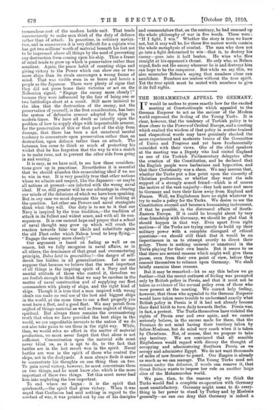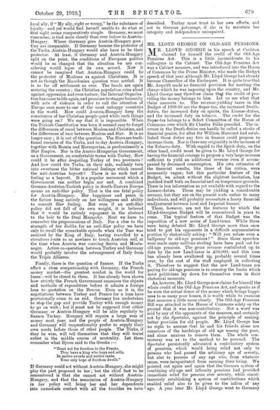THE MOHAMMEDAN APPEAL TO GERMANY.
IT would be useless to guess exactly how far the excited meeting at Constantinople which appealed to the German Emperor to act as the saviour of the Moslem world expressed the feeling of the Young Turks. It is clear, however, that the tendency of Turkish policy is to draw closer to the Powers of Central Europe, and a meeting which exalted the wisdom of that policy in scatter-brained and rhapsodical words may have genuinely shocked the more experienced and moderate brains of the Committee of Union and Progress and yet have fundamentally coincided with their views. One of the chief speakers at the meeting was a Deputy who had visited England as one of the Turkish Parliamentary delegates after the creation of the Constitution, and he declared that the English people were barbarians and hypocrites, and that their Christianity was a sham. We may assume that, whether the Turks put a fine point upon the sincerity of Christian professions, or whether they want the safe support of a strongly armed friend—which is of course the motive of the vast majority—they look more and more to Germany and turn their faces away from England and France. Well, we Englishmen have no right whatever to try to make a policy for the Turks. We desire to see the Constitution succeed and become a humanising instrument, if that be possible, in the distressed affairs of South- Eastern Europe. If it could be brought about by very close friendship with Germany, we should be glad that it should happen in that way. Even apart from right motives—if the Turks are trying merely to build up their military power with a complete disregard of ethical questions—we should still think that it would be an impertinence in us to attempt overtly to direct their policy. There is nothing unusual or unnatural in the Turks playing for their own hands. But it seems to us that there are several reasons which might well give them pause, even from their own point of view, before they commit themselves to reliance upon Germany. We shall briefly examine these reasons.
But it may be remarked—let us say this before we go further—that the recent outburst of feeling was prompted only by British policy in Persia, and that it must not be taken as evidence of the normal policy even of those who were present at the meeting. We cannot help feeling, however, that those who appealed to the German Emperor would have taken more trouble to understand exactly what British policy in Persia is if it had not already become their fixed habit to turn daily towards Berlin. Persia was, in fact, a pretext. The Turks themselves have violated the rights of Persia over and over again, and we cannot seriously believe, in the excuse made for them, that the Persians do not mind having their territory taken by fellow-Moslems, but do mind very much when it is taken by Christians. Not, of course, that we propose to take any territory. We are convinced that all sensible Englishmen would regard with dismay the thought of occupying and administering Southern Persia as we occupy and administer Egypt. We do not want thousands of miles of new frontier to guard. Our Empire is already as much as we can manage. The Young Turks need not remain under the delusion, if words can remove it, that Great Britain wants to impose her rule on another large slice of the Mohammedan world.
We pass, then, to the reasons why we think the Turks would find a complete co-operation with Germany most unsatisfactory. Germany might mean to do every- thing in her power to stand by Turkey and by Moslems generally—no one can deny that Germany is indeed a loyal ally, if "My ally, right or wrong," be the substance of loyalty—and yet would find herself unable to do what at first sight seems comparatively simple. Germany, we must remember, is tied more closely than ever before to Austria- Hungary. Where Germany goes Austria-Hungary goes ; they are inseparable. If Germany became the protector of the Turks, Austria-Hungary would also have to be their protector. At least, if Germany and Austria-Hungary split on the point, the conditions of European politics would be so changed that the situation we are con- sidering would lapse of its own accord. Now it cannot be imagined that Austria-Hungary could be the protector of Moslems as against Christians. It is not as though the Macedonian question were settled. It is as far off settlement as ever. The bands are again scouring the country ; the Christian population cries aloud against oppression and even torture; the Internal Organisa- tion has come to life again, and promises to stagger humanity with acts of violence in order to call the attention of Europe once more to one of the most unhappy countries in the world. How could Austria-Hungary keep the consciences of her Christian people quiet while such things were going on ? We say that it is impossible. When the Turkish Constitution was born it seemed easy to forget the differences of creed between Moslem and Christian, and the differences of race between Moslem and Slay. It is no longer easy ; it is out of the question. The Slays are tradi- tional enemies of the Turks, and to-day Austria-Hungary, together with Bosnia and Herzegovina, is predominantly a Slav Empire. Nor is the Austro-Hungarian Government, as a Government, on comfortable terms with Turkey. How could it be after despoiling Turkey of two provinces ? And how could the Turks, on their side, suddenly turn into sweetness the bitter national feelings which caused the anti-Austrian boycott ? There is no such test of feeling as a boycott. It is a popular movement which a Government can neither begin nor end. A combined German-Austrian-Turkish policy in South-Eastern Europe means an anti-Slav policy. That is the one fatal policy for Austria-Hungary. Her happiness and peace in the future hang entirely on her willingness and ability to consult Slav feeling. But even if an anti-Slav policy did not fall of its own weight, it is believed that it would be entirely repugnant in the abstract to the heir to the Dual Monarchy. Next we have to remember the prepossessions of Italy. For a clue to the strength of her dislike for an anti-Slav policy we have only to recall the remarkable episode when the Tsar was received by the King of Italy, having travelled by a circuitous route so as nowhere to touch Austrian soil, at the time when Austria was coercing Servia, and Monte- negro. Active co-operation between Turkey and Germany would probably involve the estrangement of Italy from the Triple Alliance.
Finally, there is the question of finance. If the Turks effect a close companionship with Germany, the French money market—the greatest market in the world for loans—will be closed to them. It has already been shown how strictly the French Government examines the objects and methods of expenditure before it admits a foreign loan to quotation on the Bourse. Even as it is, the negotiations between Turkey and France for a loan have provisionally come to an end. Germany has undertaken to stop the gap and provide Turkey with enough money to go on with • but it must not be supposed that either Germany or i.ustria-Hungary will be able regularly to finance Turkey. Hungary will require a large sum of money next year, and the people of Austria-Hungary and Germany will unquestionably prefer to supply their own needs before those of other people. The Turks, if they be wise, will tell themselves that they will travel safest in the middle course of neutrality. Let them remember what Byron said to the Greeks :— " Trust not for freedom to the Franks, They have a king who buys and sells.
In native swords and native ranks Your only hope of freedom dwells."
If Germany could act without Austria-Hungary, she might play the part proposed to her ; but the chief fact to be remembered is that she cannot act without Austria- Hungary, and that the association of Austria-Hungary in her policy will bring her and her dependents into immediate contact with 'all the troubles we have described. Turkey must trust to her own efforts, and not to German patronage, if she is to maintain her integrity and independence unimpaired.















































 Previous page
Previous page